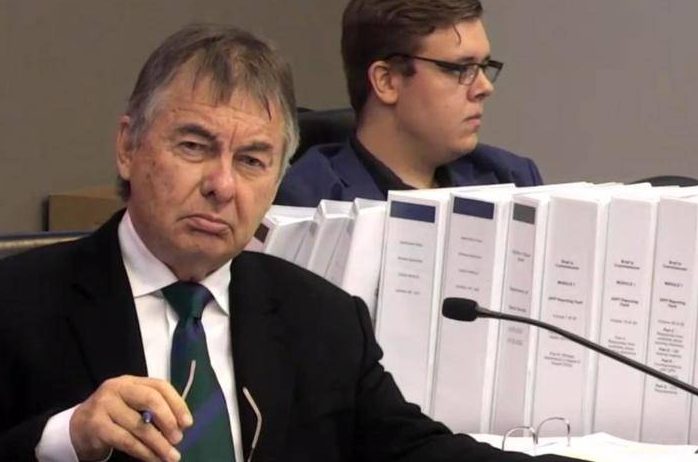
“The right thing, the honest thing for the Integrity Commission to do would be to close down this nonsense as lacking any proper basis and get back to completing its more important, long delayed and unfinished investigations.” HUGH SELBY says there are no reasonable grounds to investigate Walter Sofronoff.
This column was updated on May 21
In the ACT, the body with the mission to root out public-office corruption is called the Integrity Commission.

Although the Integrity Commission Act defines many terms, it does not define integrity or a person with integrity. Its dictionary meaning is to be honest and to have unshakeable moral principles.
I would expect an integrity commission to live up to its name. Let’s have a look to see if it does.
On April 5 the commission announced, by way of a media release: “The Commission… is assessing corruption allegations regarding the conduct of the Hon Walter Sofronoff KC.
“The assessments relate to disclosures made by the Hon Walter Sofronoff KC to media representatives during the course of the Board of Inquiry, the release of his report to media representatives before the report was released by the Chief Minister and communications with media that were disclosed in recent litigation in the Supreme Court of the ACT.”
Integrity Commissioner Michael Adams KC elaborated on his decision, saying: “Given the extraordinary and ongoing public discourse about the conduct of the Board of Inquiry and the recent judgment in the Supreme Court in Drumgold v Board of Inquiry and Ors (No. 3), I have determined that it is in the public interest to disclose that the commission is assessing whether the issues call for investigation.”
On May 13, there was a further media release: “The commissioner has completed his assessment of these allegations and has decided to commence an investigation into the impugned conduct as he suspects, on reasonable grounds, that Mr Sofronoff’s conduct may constitute corrupt conduct.
“The allegations assessed by the commissioner relate to the provision by Mr Sofronoff of his report to two journalists before it was made public by the Chief Minister, allegedly in breach of the requirements of the Inquiries Act 1991 and allegedly constituting corrupt conduct under the Integrity Commission Act 2018.”
The main point taken in the Supreme Court by Mr Drumgold as he sought to have the adverse findings against him negatived as being “legally unreasonable”, was the many phone calls during the inquiry between Mr Sofronoff and an experienced, successful, opinionated journalist for “The Australian”.
Those phone calls gave rise to an “apprehension of bias” and no more. There was no finding that the phone calls had interfered with Mr Sofronoff’s conduct of the inquiry or his report writing.
Mr Drumgold established legal unreasonableness only in Mr Sofronoff’s criticism of his cross-examination of Senator Reynolds.
Mr Drumgold also established that he had been denied “natural justice” with respect to a Freedom of Information application.
On the other matters he failed to persuade the court that Mr Sofronoff’s findings against him were legally unreasonable.
For all practical purposes former DPP Mr Drumgold’s resort to the courts was in vain. For further detail please refer to the decision here.
There was nothing in Mr Sofronoff’s discussions with that journalist that could fit within the legislative definitions of corrupt conduct.
Hence those phone calls that figured in the April press release have disappeared in the May release. Looking up one’s own guiding legislation is a task that should be done before, not after, issuing a media release. If those phone calls were to be mentioned in the April release it should have been to point out that:
- They had been the subject of close judicial analysis in the Supreme Court proceedings;
- They gave rise to an apprehension of bias and no more than that; and,
- While ill-advised (because they were not disclosed when they were being made, and there were many of them) there was nothing about those phone calls that came within the purview of the Integrity Commission.
Nothing in breach of the Inquiries Act
What’s left is Mr Sofronoff’s giving of two embargoed copies of his report to two journalists, one being the same journalist at “The Australian”, the other with the ABC.
The first question raised in the May media release is whether giving those two embargoed copies breached the Inquiries Act, that being the law that governs how public inquiries are conducted.
That is a question that I answered in a City News article on August 8, when I wrote: “The ABC reported (Monday, August 7) that in response to questioning, Mr Barr said he had not ruled out seeking the advice of the [ACT] Integrity Commission on whether Mr Sofronoff had broken the law [by giving the report to the media].
‘I think there is a degree of objectivity that is required in assessing whether this constitutes a breach,’ he said.
“A reasonably straight reading of section 17 of the act would clearly indicate that it is. The question of whether there are any mitigating circumstances remains to be seen.”
“Mr Barr has erred in his ‘reasonably straight reading of Section 17’. His keen eyes missed the all-important words in that section that prohibit publication ‘except in the exercise of a function under this Act’.
“While the act requires delivery of the report to the Chief Minister, there is nothing in the act that prohibits the commissioner from providing embargoed copies to anyone he likes.
“But that’s not all. The commissioner has the same protection and immunities as a judge of the Supreme Court in proceedings in that court [Section 16].
“The Chief Minister’s advisers had best share with him the sad tale of a Queensland chief magistrate who was prosecuted for the manner in which she exercised her powers. She was convicted. The case went all the way to the High Court where the judges asked both parties why no one had noticed that the chief magistrate had immunity. Conviction overturned.
If our beloved chief minister wants to ask the Integrity Commission for its opinion on Commissioner Sofronoff’s conduct, that is part of the answer he will receive. I doubt he’ll want to make that public.”
Clutching at imaginary straws
That leaves the issue of whether his provision of those two copies amounts to “corrupt conduct” within the Integrity Commission legislation. To answer that question let’s look at how it is defined.
Under Section 9, corrupt conduct is conduct—
(a) that could—
(i) constitute a criminal offence; or…
(iii) constitute reasonable grounds for dismissing, dispensing with the services of, or otherwise terminating the services of, a public official; AND
(b) that is any of the following:
(i) conduct by a public official that constitutes the exercise of the public official’s functions as a public official in a way that is not honest or is not impartial;
(ii) conduct by a public official … that—
(A) constitutes a breach of public trust; or
(B) constitutes the misuse of information or material acquired by the official in the course of performing their official functions, whether or not the misuse is for the benefit of the official or another person…
For the purposes of this article we can assume, first, that Mr Sofronoff when conducting his inquiry was a “public official” (per section 12); second, that the inquiry was “an entity of a public nature” (per section 18); and, third, per the May press release that the commission is looking only at “corrupt conduct”, not “serious corrupt conduct” (per section 10).
Try as I might, I cannot read those definitions as covering Mr Sofronoff’s well-meant endeavours to have mainstream media capable of reporting comprehensively and insightfully on his findings.
An embargo is just that: a restriction on publication until a future defined event, on the basis that those given the benefit of it will keep their side of the bargain.
Regrettably “The Australian” did not, claiming to have received a leaked copy from another source, and circumventing the embargo on that basis,
Putting to one side his “stars in the eyes fancy” in being too available to the journalist from “The Australian”, he was quite open about making documents available to the public and inviting media contact with his inquiry.
For example, on a couple of occasions I needed to obtain a transcript of the day’s hearing. Even after hours I was quickly helped by counsel assisting.
I found the openness of his inquiry a refreshing attempt to be accountable and accessible in real time.
Taking together each of the types of conduct that may amount to “corrupt conduct”, the Hon. Walter Sofronoff KC’s giving two mainstream journalists an embargoed copy of his final report was not a criminal act, nor could it ever have constituted reasonable grounds to terminate his appointment.
Moreover, because the test for corrupt conduct is cumulative, the embargoed release raised no issues of honesty or impartiality by him, was not a “breach of trust”, and was not “a misuse of information”.
Contrary to the claim in the May media release, there are no “reasonable grounds” to suspect any corrupt act.
It’s also worth noting that the likelihood of a much respected, highly experienced, former senior judicial officer disobeying the legislation under which he works is remote, so much so that to suggest it, in the absence of some provable conversation or note in which he says or writes to the effect, “I am above the law. I will do what I like” is risible.
The right thing, the honest thing for the Integrity Commission to do would be to close down this nonsense as lacking any proper basis (under Section 71.2), and get back to completing its much more important, but too long delayed and unfinished investigations.
Former barrister Hugh Selby is the CityNews legal columnist. His free podcasts on “Witness Essentials” and “Advocacy in court: preparation and performance” can be heard on the best known podcast sites.
Who can be trusted?
In a world of spin and confusion, there’s never been a more important time to support independent journalism in Canberra.
If you trust our work online and want to enforce the power of independent voices, I invite you to make a small contribution.
Every dollar of support is invested back into our journalism to help keep citynews.com.au strong and free.
Thank you,
Ian Meikle, editor









Leave a Reply